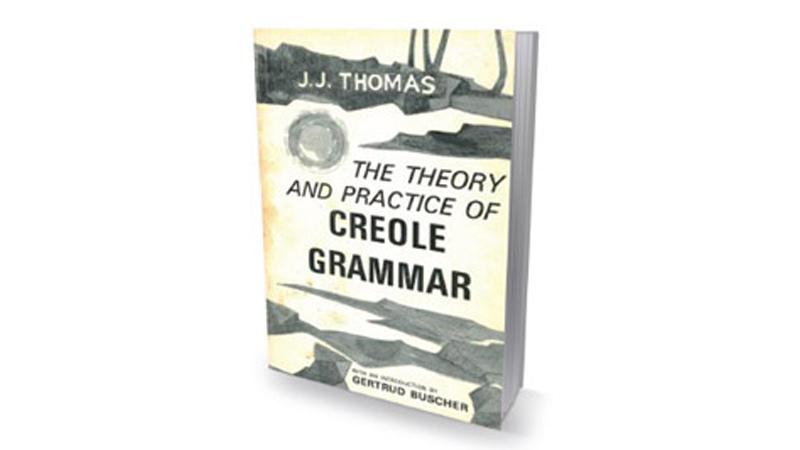JOHN JACOB THOMAS PIONEER IN PATOIS
BY JO-ANNE S FERREIRA

Nineteenth-century Trinidadian teacher, linguist, writer and public intellectual, John Jacob Thomas, was famous for Froudacity (1889), his published rebuttal to a colonial racist rant.
But two decades prior, Thomas was a pioneer in Patois (French Creole). Not a native speaker of Patois, Thomas was exposed to it at a time when the majority in Trinidad were speakers of the language. He began his analysis and research into Patois in 1866 (when it was not even recognised as a “language”), culminating in his groundbreaking The Theory and Practice of Creole Grammar. The grammar was published in 1869 in Port of Spain (Chronicle Publishing Office), 150 years ago.
Not only is this the first grammar of any French Creole variety anywhere in the world, but in modern contemporary terms, this single volume fits into Creole linguistics, historical linguistics, morphology and syntax, translation studies (including Bible translation), folklore studies, and language documentation. Thomas continued writing, producing an essay comparing French Creole with English Creole, and discussing the influence of African languages on Creoles. He had plans to produce an even more in-depth and comparative grammar before he died at just 48 years old in 1889.
Thomas, a ward school teacher, noted in his introduction the discrimination particularly faced by monolingual Patois speakers in the legal and educational systems, problems that still confront predominantly Patois speakers in the Caribbean today:
“In the administration of Justice in this Colony, the interpreting of Creole occurs as a daily necessity. Yet it is notorious that, in spite of constant practice, our best interpreters, though generally persons of good education, commonly fail in their renderings, especially from Creole into English.”
Thomas wrote that this was no doubt partly due to the inherent difficulty of interpreting consecutively and accurately. He noted that interpreting was also very difficult “because our interpreters, like everybody else, neglect to study” the structure and usage of the Creole language. The lack of study was partly due to “the prevalence of opinion that Creole is only mispronounced French, and partly by the want of some such manual as the present.”
Thomas’ grammar recognised the inherent linguistic equality of the language, vis-à-vis any other language, while confronting the social inequality besetting the speakers of Patois. In 1870, an American contemporary, Addison van Name, described the text as “the most extended and valuable work on the grammar of the language”, and it remains the foundation for all studies of Trinidadian French Creole, and indeed all Lesser Antillean varieties. An 1872 review describes it as “the first detailed grammar of a French Creole dialect. Useful, thorough, and detailed, but suffers from etymological spelling and reliance on French grammar to describe Creole.”
In 1969, New Beacon Books in London published the 100th Anniversary edition of Thomas’ grammar, with an introduction, biographical sketch and appreciation of Thomas by Gertrud Aub-Buscher, now compiling a Trinidadian Patois dictionary. New Beacon was founded by Trinidadian John La Rose and Sarah White. La Rose, a visionary and activist not to be forgotten, is the subject of the 2003 documentary: Dream to Change the World: The Life and Legacy of John La Rose, directed by Horace Ové. Writing as Anthony La Rose, he penned the poem Song to an Imperishable Sunlight (Foundations, 1966), paying tribute to Thomas and his genius:
Our Jacob was not coatless;
our Jacob Thomas wrote a grammar
in patois
to remove the scales from justice’s eyes
for peasants
who spoke no word of English
in milord’s court.
And Jacob answered proud England’s Froude
for his ‘froudacity’
in challenging our right to revolt
to rule our land.
Still each generation lives its present,
in huge hiatus,
unaware.
Creole Linguistics has advanced considerably in the last 150 years, including a standardised orthography for Lesser Antillean French Creole pioneered by Lawrence D Carrington (UWI), and Jean Bernabé of the Université des Antilles. This new orthography moved away from Thomas’ “etymological spelling and reliance on French grammar”, and the many other individualised and inconsistent spelling systems used up to the 1970s. The one system increases the potential to share literature (including traditional oratures now being put in writing).
In spite of advances in Creole Linguistics and in spite of increasing recognition of the language’s validity, Trinidadian Patois (and also the related Grenadian and Venezuelan varieties of French Creole) is facing extinction. As a heritage language, Trinidadian Patois is recognised as particularly contributing to the language of flora, fauna, folklore, and festivals. Efforts are afoot to document remaining fluent and less fluent speakers of all three varieties, for the present and future generations, “in huge hiatus, unaware”.
The main avenues to access information about Trinidadian Patois are provided on UWI Space, the UWI-T&T Research and Development Impact (RDI) Fund website for Trinidad and Tobago Endangered Languages (TTEL): Digital Documentation of National Heritage Languages, and via Facebook (Trinidadian Patois Speakers) and YouTube playlists.
Our Jacob’s work continues, and remains a solid foundation on which we build and build awareness.
Jo-Anne S. Ferreira is the Head, Department of Modern Languages and Linguistics, Director of the Caribbean Interpreting and Translation Bureau, and President of the Society for Caribbean Linguistics